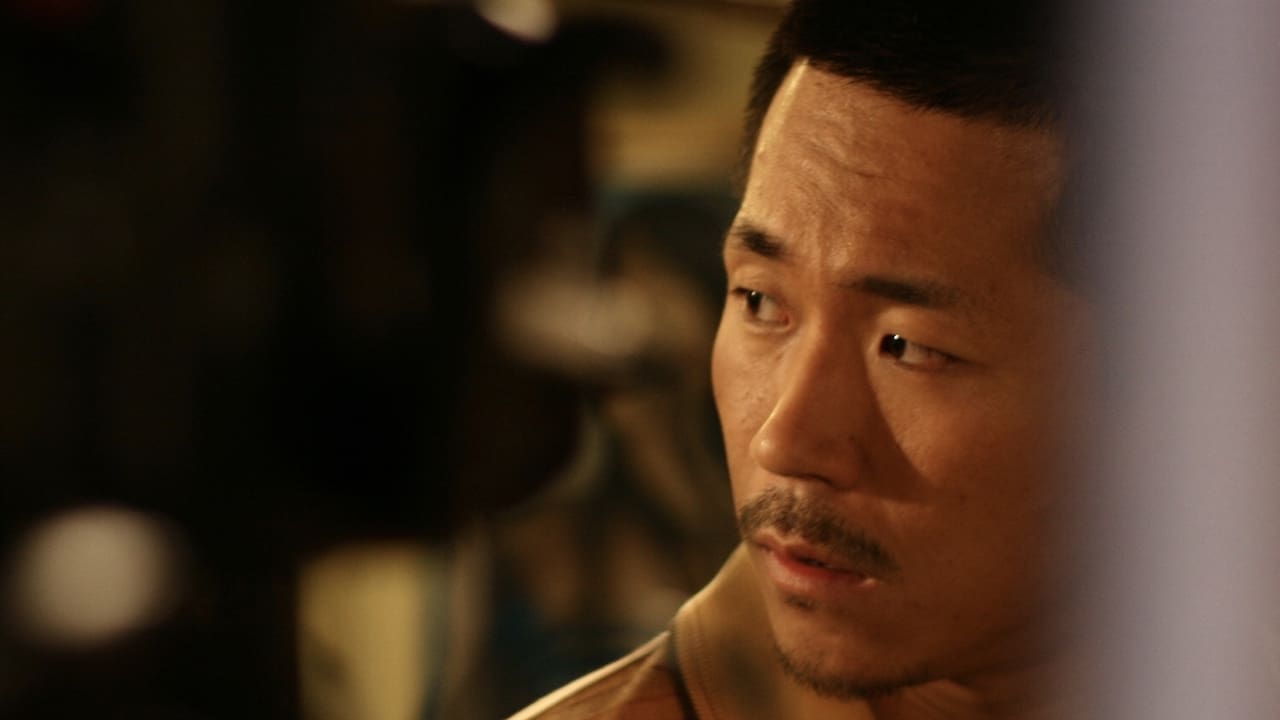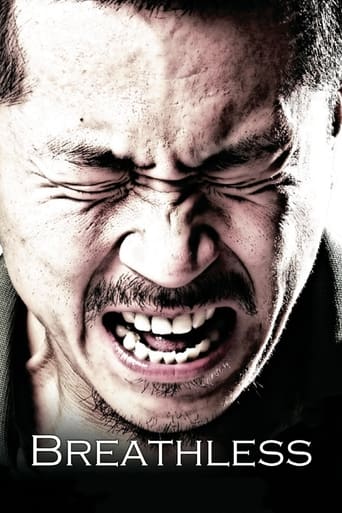

7,6 ratings. Really? I read all the reviews and I wonder what I missed? It must be in the second half of the movie than because in the first half of the movie there was nothing to see besides unnecessary cursing, unnecessary cheap violence, pretty bad acting, and a story that is going nowhere and that is beyond boring. Since I have the honor to be the first one to write a bad review I wonder if I have no taste at all and all the others have good taste, or is it me that has good taste and all the other reviewers are just wrong. I will never know the answer and I honestly don't care. I watched seventy minutes of Breathless, had to fight not to fall asleep, and I couldn't bring myself up to suffer another hour. So I just gave up watching this and did something useful instead of further wasting my time with this movie.
... View MoreI haven't reviewed many titles but since it's 8 in the am and I'm watching it on silent (so not to wake my roommates) I figured I'd put my 2 cents in. Like I said, it's on silent and I'm only reading subtitles. Some of the scenes are so intriguing that sound seems unnecessary. I'm not really good at this but I can say that this movie sticks with you, probably for ever. This is why I say it's "up there with Old Boy". I watch, up to, 4 movies a day and sometimes I accidentally watch movies twice without realizing until the end, so when one sticks, it must be saying a lot for that film. The acting is impeccable, stylistically, it draws you in and as violent as it seems, it does hit a warm spot from time to time. Like I said, I'm no pro at film reviews but if you get what I'm trying to say, give this film a shot.
... View More(MAY CONTAIN SPOILERS) Arguably, extreme violence – or ultra-violence as Burguess would put it - has been one the most prominent traits of Korean cinema in the last decade, to the point that for many mainstream cinema-goers, it came to define it. The worldwide success and broad critical acclaim of Park Chan-wook revenge flicks, filled with gore and stylised perversity overshadowed the diversity of one of the most productive and inventive national film industries to create a stereotypical sub-genre: the extreme Korean thriller. Thematically, Breathless does not seem to disappoint the viewer's expectation: from the opening frame to the last scene, the film is relentlessly violent – but its depiction and meaning could not be more remote to Park Chan-wook's universe. Yang-Ik Jook, the director who also displays an impressive intensity in the leading role of his first feature, opts for a naturalistic approach to filming – all close-ups, simple shots and hand-held camera – light years from the complicated, westernised, post-Fight Club aesthetic of Park's vengeance trilogy. The epitome of Park Chan-Wook's visual style when dealing with violence can be found in Old Boy, with the infamous brawl in the jail corridor, where the lone hero overcomes one by one all his attackers in a virtuoso tracking-shot directly inspired by the beat-'em-up video games. Violence here is unreal: "just fun" - like in a Tarantino movie. In contrast, Sang- hoon, the main protagonist of Breathless, a debt collector spending his days beating to a pulp every single human being in sight, doesn't even know what a Playstation is (which he actually calls a "Play-shit"), until he agrees to buy one to his nephew, in a rare display of kindness. In a film saturated with symbols and totemic items (western child toys, knifes, phones, hammers), the introduction of the Playstation can be read as a departure from this insensitive, immature and virtual approach to the issue that is violence; and more specifically in Breatless' case, domestic violence. A moral tale about domestic violence and its consequences, the film reproduces the cyclical nature of child abuse. The bullied child becomes the bully; the victimised mother produces a traumatised daughter, a beating follows another beating and so on. This makes the film structurally repetitive and quite predictable, but remarkably, it also gives a forceful depth to the directors' hard-hitting argument about the responsibility that victims have in perpetuating the cycle originated by their tormentors. After an uncompromising first hour letting the viewer astonished and weary of Yang-Ik Jook shock and awe approach, the director suddenly introduces a sentimental edge to Breathless with an unexpected touching montage of the two main characters (the thug and the high school girl) taking the gangster's nephew to the fair, where he can, at last, be a child again. This passage, with its cheesy oriental music, is very reminiscent of Takeshi's Kitano similarly tender moments in his romantic gangster chronicles. This is also the only time, along with another pivotal twist taking place later on in the film (the father's suicide attempt), that Yang-Ik Jook uses mood music – the rest of the soundtrack containing only diegetic sounds of incessant kicking, punching, slapping and screaming noises, which provide, like a percussion set, the internal rhythm of the film.Littered with more swear words than a vintage Scorsese epic, Breathless, whose original title Ddjongpari could be translated "fly-shit", is also a study of the social alienation that comes with the lack of education that often originates in the trauma of child abuse: its main characters don't have the words to express their frustrations but only their fists and can only mimic what they have witnessed. Even marks of affections are sent through play-fighting (Sang-Hoon and his nephew) or verbal abuse (Sang-Hoon and the adolescent girl he calls "crazy bitch"). School education is regarded as important by all characters (the wannabe gangsters are always asked if they graduated from high-school by the mob boss) but remains a vacuous, distant, superficial dream, alien to their world of poverty and violence. The ending works superbly in a series of symmetrical narrative motifs, leaving room for hope as seen in the concluding flash-forward. The transformation of Sang-hoon is brutally quick, but remains believable. A martyr of child abuse, his will to change his ways and break the cycle will eventually kill him but save his family. It is a powerful conclusion to an overly brutal film that leave bruises like a punch in the face, but also handles its gentle moments with a disarming sincerity.More film reviews at ggendron.wordpress.com
... View MoreFoul mouthed and violent and yet extremely conventional story of a collector for a gang that finds that things begin to change once he runs across a high school senior who won't put up with his crap. The pair bonds and become friends. We also meet the other people in their lives, his sister, father, nephew and friends; and her brother, father and teachers. It's an often funny occasionally shocking look at the violence we do and is done to us. Everyone in this film is damaged and a victim of some form of violence In most cases the tough guy stance of all of the characters is stripped away as they themselves are abused in others. It's the classic struggle of people to try and fight the violence in their lives or to go with it.Made as a poke in the eye to the Korean film industry by the star who felt he had nothing to lose (he wrote and directed). The film has won numerous awards around the globe and contains some very realistic violence and some raw performances. I can see how the film rocks some people's worlds (for all my reservations about the film it does have a definite power in its conclusion) but at the same time this is a rambling, often unfocused, film that seems very conventional. This is ultimately the story of an odd couple of misfits, neither whom belong really anywhere, who find some catalyst for change in each other. Granted this is set in their violent world where families abuse and even kill other family members, nonpayment of debts will get you hit in the head with a hammer or worse, and the slightest mood shift will end up with broken heads but it is at its (bleak but hopeful) heart a well worn story.To be honest I wasn't blown away. I liked the film a great deal. I love the performances, the two leads are stunning. I love the witty repartee between the characters, which is often very funny and real in the way that you bust on friends. But at the same time I found the film much too unfocused. I described the film in an earlier post as being the sort of thing that had I seen this on DVD I would have ended up watching some of it on FF. Its good, its just too long and too rambling.A note of sorts- of all of the films I saw at the New York Asian Film Festival this was the one film that I made the most notes concerning. Sitting in a restaurant after the film I scribbled numerous pages about the film and its meanings and the things it did, and now that it comes time to actually write it up I find that the film isn't worth elaborating on the numerous pages and that abbreviating them to the preceding entry was enough. Somehow 24 hours after seeing it the film no longer matters.Its worth a look, but not at the top of your list.Between 6 and 7 out of 10
... View More